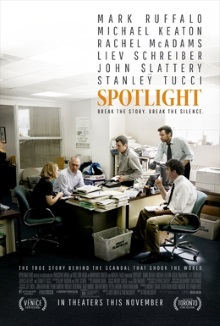
Most years, it feels like a big, important film arrives to sweep the field of the Academy Awards. This was not true this year, for films released in 2015 as the Oscars were mostly parceled out between The Revenant, Mad Max: Fury and Spotlight. Spotlight in particular won Best Picture and Best Original Screenplay but unusually did not win Best Director. This is probably because Spotlight is important mainly because of the historical events it covers rather than for its merits a vehicle for artistic expression.
The title Spotlight itself refers to the investigative journalism unit of The Boston Globe newspaper. In 2001, a new editor who isn’t a native Bostonian suggests a new project for the team: finding out the truth of allegations of a local lawyer that the Archbishop of Boston had known that a priest John Geoghan had been sexually abusing children for years but had done nothing to stop him. The case soon widens in scope however as the team discovers that this isn’t just an isolated case. After contacting a victims’ rights group, the journalists realize that there may be dozens of pedophile priests and that the church authorities have been quietly protecting them for decades, using money and social pressure to silence the families of the victims rather than bring the cases to the police.
It’s a messy, complex case with lots of characters involved and takes place over the course of many months. So it’s to this film’s credit that it manages to give an impressively complete account of what happened in plenty of detail while keeping the audience engrossed in the drama. Despite the fact that this is a topic that obviously rouses the emotions, the film even refrains from either lionizing the journalists or turning the church authorities into villainous caricatures. As Robby, the editor who runs the Spotlight team and is played by Michael Keaton, realizes, it’s not just the church. It’s everyone who is part of the establishment and even the Boston Globe itself as a newspaper that has been a respected institution in the city and yet has failed to pick up on the many clues about what has been happening in the city for decades out of deference to the Catholic Church.
In fact, what really makes me love this film is that it’s as much about the newspaper itself as it is about the sexual abuse scandal. The case makes for a great argument for the importance of investigative journalism. Note how the team spent months on the investigation, with all of the expenses that entails, before publishing so much as a single article on the topic. Having this information come to light is clearly in the public interest and yet it’s almost impossible to find any reasonable model under which money could be made for performing this public service. This film even shows that the commercial interest of the newspaper isn’t perfectly aligned with the public interest. The team holds off on publishing their expose after the 9/11 distracts the whole of the United States and siphons off their journalistic resources to the frustration of the victims who believe that they’ve been hung out to dry. There’s also tension as the team needs to ensure that competing newspapers don’t beat them to the punch, wasting months of effort, but for the victims and their lawyer, it’s clearly more important that the scandal be exposed as quickly and as widely as possible.
All of the performers account well for themselves and Mark Ruffalo deserves his Oscar win for Best Supporting Actor as a passionate journalist who is disappointed by how the church has let everyone down. At the same time, I also understand why it didn’t win the Oscar for Best Director. It’s superbly made but lacks the kind of creative flair that makes some films so unique. Still, it’s one of the finest examples I can think of about films that focused on topical issues and I can’t recommend it highly enough.